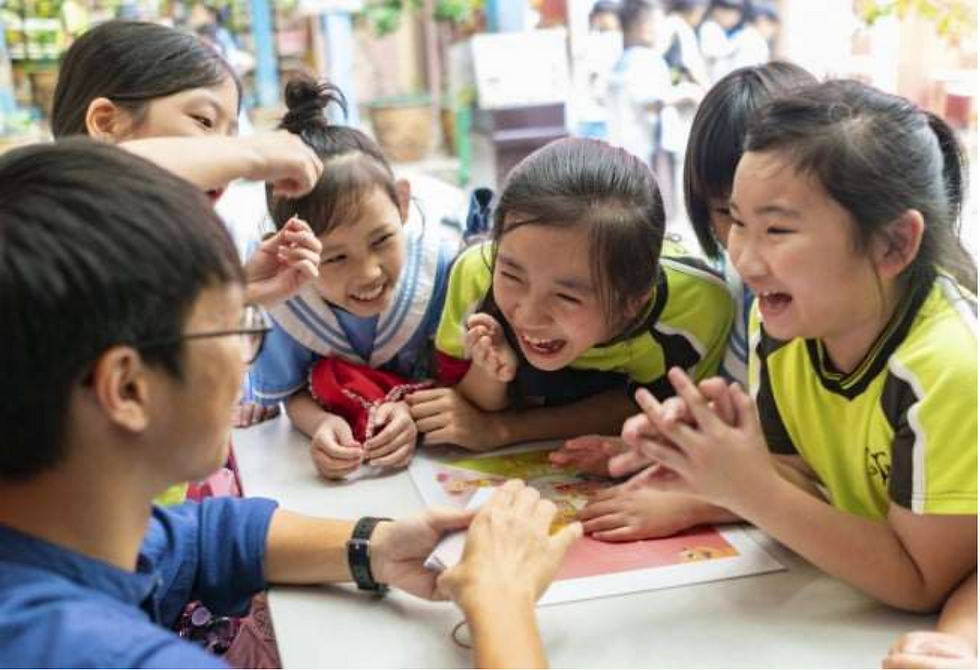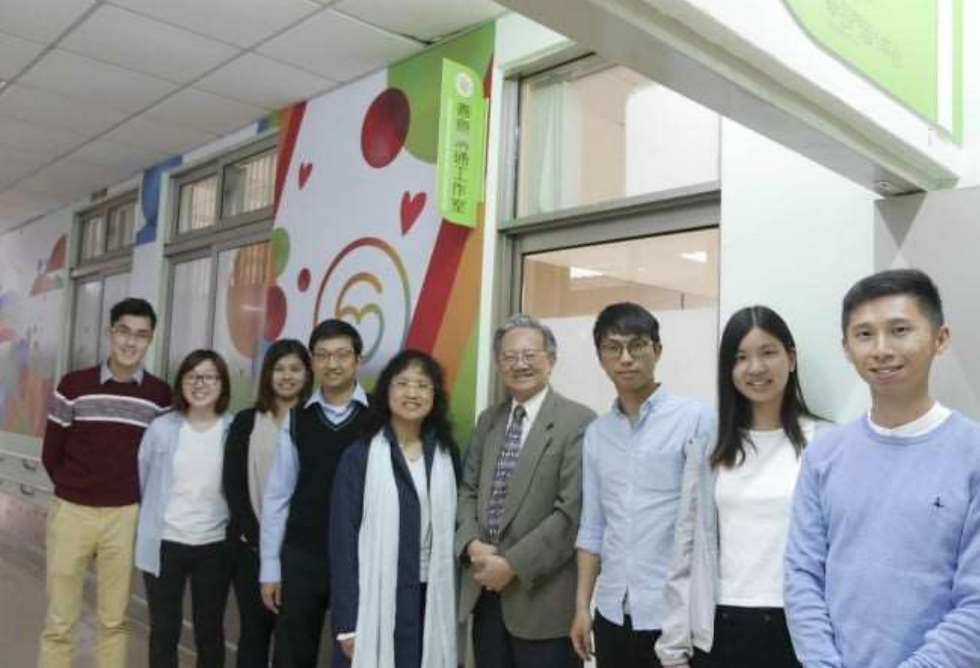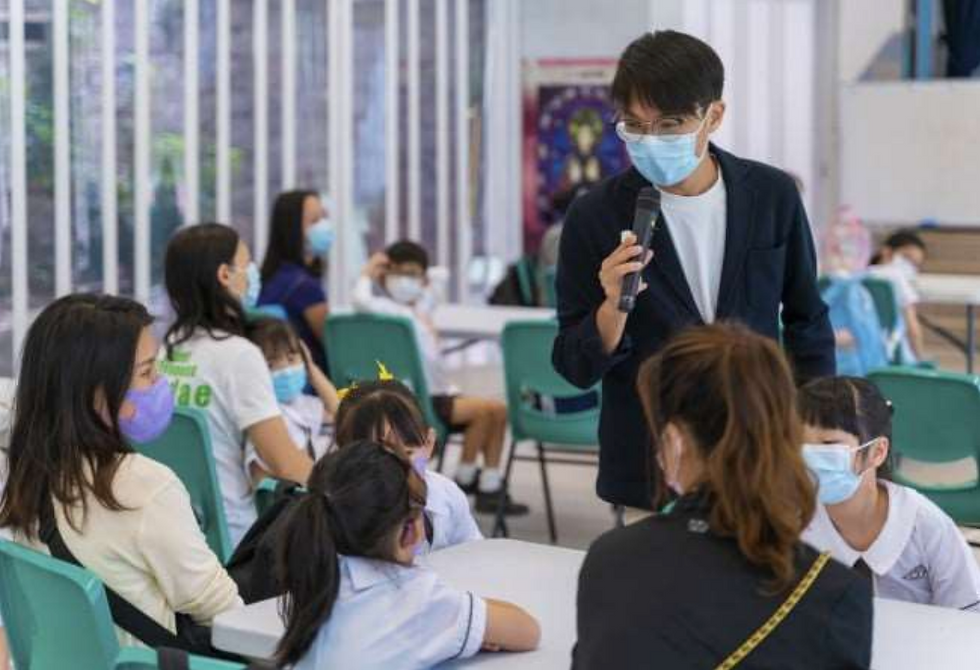He survived an abusive childhood. Now his NGO trains teachers and parents with compassion
- JUST FEEL感講
- Jul 17, 2023
- 7 min read
Updated: Oct 12, 2023
The co-founder of social enterprise JUST FEEL, which provides compassion training for schools and families, tells Kate Whitehead how his violent childhood inspired him to teach kids and parents how to communicate.

Raymond Yang, co-founder of the social enterprise Just Feel. Photo: Jelly Tse
PASSPORT TO HAPPINESS
My father moved to Hong Kong from Fujian in 1976 at the end of the Cultural Revolution, when he was 18. He worked super hard, as a street cleaner, a chef and later as a photocopier technician.
He was cooking noodles in a restaurant in Daimaru, a department store in Causeway Bay, when he overheard my mum speaking Hokkien. She was born in Hong Kong but grew up speaking Hokkien with her parents. She was also working at Daimaru, selling jewellery.
They immediately got on, they were both frugal and wanted to start a family. Hong Kong’s economy was booming and their work was stable, I think it was a good time for them. I have two sisters – one born in 1990 and one in 1993. I was born in 1994.
A TURN FOR THE WORSE
My parents were very frugal and we never went out for meals, on holiday or had new clothes or toys. When I was young, I was happy. Although our life was simple, I had a lot of my needs fulfilled – care, love, a sense of belonging and safety.
When I was in kindergarten, my parents bought a rooftop house in a walk-up building in North Point. The trouble started when my father decided to buy a nicer flat in Sai Wan Ho in 2002. It was expensive and (following the 2003 property crisis) his financial stress went up a lot and he became emotionally unstable.
I didn’t know why we lived together if we hated each other so much - Raymond Yang on his childhood
He shouted at us kids and my mum and beat us. I became afraid and gradually lost the ability to express my feelings. My mum told me not to irritate my father. If I cried, I’d be beaten more, so I kept my mouth shut. The sister closest to me in age cried and shouted and cursed because of how my dad was acting.
My parents could argue over anything, whether someone was eating too fast or walking too slowly. My father’s siblings were all new immigrants from Fujian. They were quite poor, had low self-esteem and fought a lot. I never understood why we had to meet all the relatives at Chinese New Year when everyone just argued.
ENDING IT ALL
When I was 13 years old, I wanted to either leave home or commit suicide. My father
would test me on my English vocabulary and if I got something wrong, he would curse me, beat me and tell me I was useless. I wasn’t allowed to play games or talk to friends.
I became lonely and frustrated, but I didn’t have the courage to commit suicide and I didn’t
have the courage to leave home. But my sister told me she was planning to commit suicide, she said if I told anyone she’d never forgive me.
I was afraid and told my cousin, who told my mum, who told my dad. I think that made them realise how much they’d hurt us, and they changed a little, but just a little.

Raymond Yang (left) during a teaching fellowship at a Hong Kong primary school in 2017. He noticed that many of the kids weren’t able to express themselves well and wondered whether they’d had a similar childhood to him.
Photo: courtesy Raymond Yang
One time my parents got into a fight and threatened each other with knives. I got between them to stop them and told them to get divorced or I’d call the police. I didn’t know why we lived together if we hated each other so much.
FINDING MY FEET
When I was 14, I got a girlfriend, and it was when I was speaking to her on the phone that I was able to put aside everything that was happening at home and feel more stable. She went to the Hong Kong Federation of Youth Groups in Shau Kei Wan to do some voluntary work. I wanted to hang out with her, so I went, too.
That led to me joining many activities at the centre – hiking, abseiling, mountaineering – and I became really attached to the social workers and the employees there. They became parents to me, giving me security, safety, love and care.
I was at a band one school, in the bottom class for my year, and the teachers were always telling us we were rubbish and that we should go to another school.

Raymond Yang (above, right) rock climbing 2010. Photo: courtesy Raymond Yang
As I spent more time at the youth centre, I gradually became more confident and motivated to study. Although I didn’t know anyone who had been to university, people always said that it was important, it could save your life, so I decided that’s what I wanted to do.
SAFE SPACE
I was among the first batch of students to do the Diploma of Secondary Education and got into the Chinese University of Hong Kong, New Asia College and moved into a dorm. Away from my family life, I’d never felt so safe.
I majored in government and public administration. I wanted to help solve the social issues that I’d seen, I didn’t want other kids to go through what I’d been through.
During my time at university I got scholarships, which allowed me to get involved in student union activities and exchange programmes. I spent six weeks at Yale University (in the United States), joined the United Nations Internet Governance Forum
in Guadalajara, Mexico, on behalf of Hong Kong as a NetMission ambassador, and went to Kenya for a summer internship in 2016, and helped organise the third Africa Tech Challenge for African youth.

Raymond Yang in 2014 hugging his closest friend at university, who two years later committed suicide. His death changed the course of Yang’s life. Photo: Raymond Yang
CRUSHING LOSS
In my final year, my closest friend at university committed suicide. It changed my life. I
agonised over why I hadn’t been a better listener when he came to me and shared his loneliness.
His death prompted me to start reading books on counselling, psychology and therapy. I went to therapy and cried lots. Along the way I learned about non-violent communication, which really resonated with me.
TEACHING COMPASSION
After graduation, I was a Teach For Hong Kong teaching fellow at a local primary school. I taught Primary Three. I noticed that many of the kids weren’t able to express themselves
well – some were silent and others were acting out.
I wondered what had happened to them and whether they’d had a similar childhood to me. I began talking to them about non-violent communication. One student said his parents had never asked him about his feelings.

Raymond Yang (third from right, above) during a visit to Taiwan to meet Dr Joseph Cheng and learn about non-violent communication. Photo: Raymond Yang
I spoke to the disciplinary master and the principal and they encouraged me to dig deeper into non-violent or compassionate communication.
Matthew Kwok Tsz-lok, who was a Teach For Hong Kong fellow at the same school, and I connected through Facebook with a psychiatrist in Taiwan, Joseph Cheng, who had experience promoting compassionate communication in schools there.
He agreed to teach us.
My sister and I have decided not to have kids until we are healed; we want the trauma to stop with our generation - Raymond Yang
In 2018, Matthew and I, the principal and the disciplinary master and our girlfriends went to Taiwan to learn about how they promoted compassionate communication in schools.
The principal was enthusiastic and said that if Matthew and I were dedicated to this he’d give us space to try out what we could do at the school.
Together with Anthony Ngai King-kwok we founded JUST FEEL in 2018 and started training teachers in compassionate communication, talking to kids and resolving their conflicts, providing some social and emotional curriculums and relationship-building activities.

Raymond Yang facilitating a workshop in 2018, the year he co-founded Just Feel, a social enterprise which aims to transform the communication culture in schools and families. Photo: Raymond Yang
We tried everything in that year and the pilot became the model for the Compassionate School Programme and we gradually promoted it in other schools.
SUPPORT NETWORK
The 2019 social movement and the pandemic increased people’s awareness of the importance of communication and mental health, it made society, parents and teachers pay much more attention to kids’ social and emotional growth and we were lucky to be supported by a lot of schools and foundations.
In the beginning, I learned compassionate education to support the kids, then I realised that to support the kids we had to first support the parents and teachers. And then, when we had more staff, I realised that to support the teachers and parents we needed to support the staff who support them.
In the end, I realised to support the staff I had to support myself. It made me realise that I’d been avoiding conflict at work and with my girlfriend because I associated conflict with my father, who would get angry, shout and beat me.

Raymond Yang (front, second from right) with the JUST FEEL team. Photo: courtesy Raymond Yang
POST TRAUMA
Last April my grandfather died. My father argued with his siblings at the funeral and they had a big fight afterwards. I physically stepped in to separate them. That triggered my traumatised behaviour and I wasn’t fully present for a couple of weeks.
I broke up with my girlfriend of five years soon after that. The break-up pushed me to get help and I went to see a psychiatrist and got support for complex PTSD. My inner critic and the toxic shame comes out so easily, I’m now learning cognitive and somatic therapies to heal.
I think my parents were also traumatised, it passes through the generations. My sister and I have decided not to have kids until we are healed, we want the trauma to stop with our generation.
JUST FEEL is helping me heal my own childhood. Whenever I hear stories about kids being healed through empathetic conversations with their teachers and parents, I think, “OK, one more kid doesn’t have to go through what I went through.”
If you have suicidal thoughts or know someone who is experiencing them, help is available. In Hong Kong, dial +852 2896 0000 for The Samaritans or +852 2382 0000 for Suicide Prevention Services.


Comments